AWM41 964 - [Nurses Narratives] Sister E G Dobson - Part 1
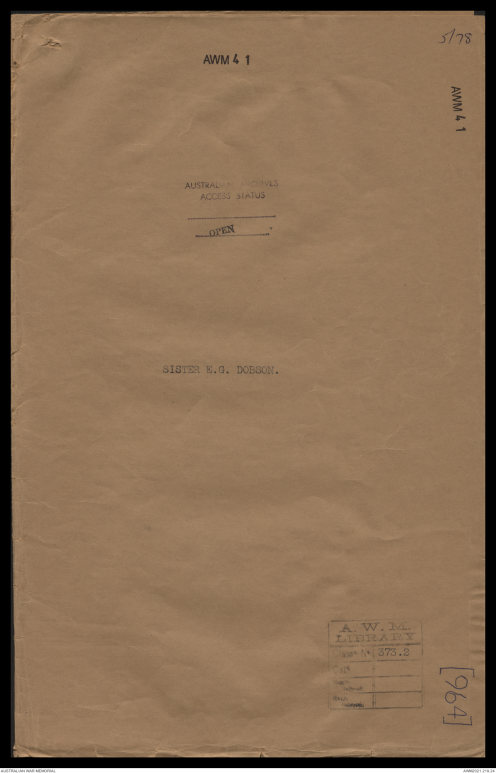
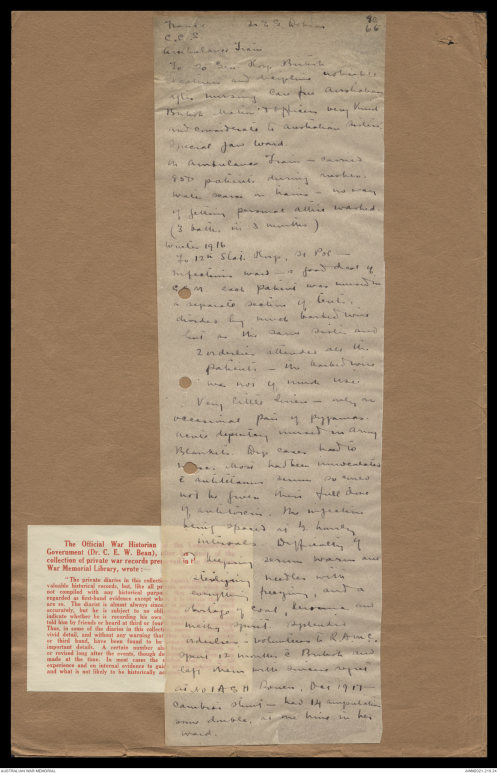
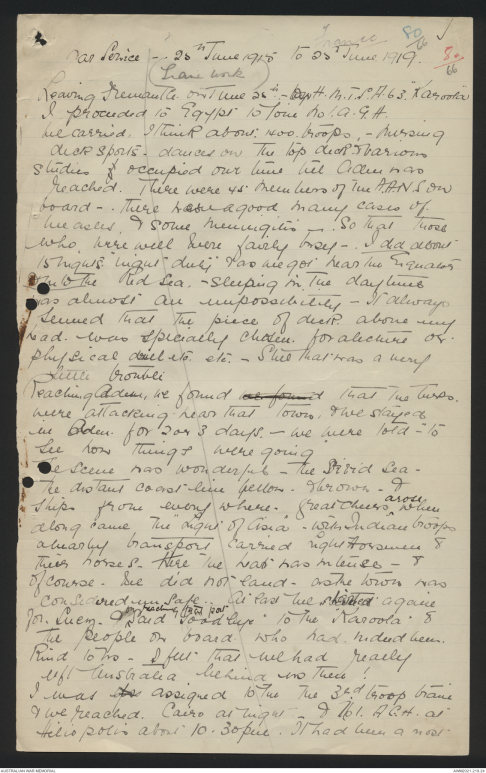
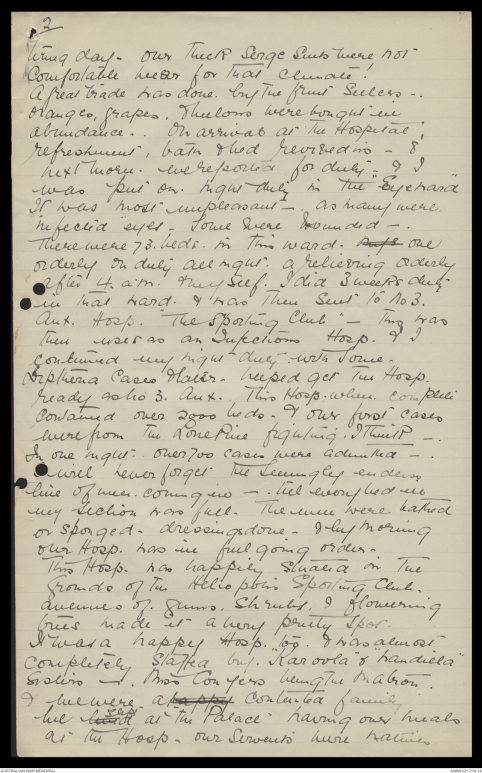
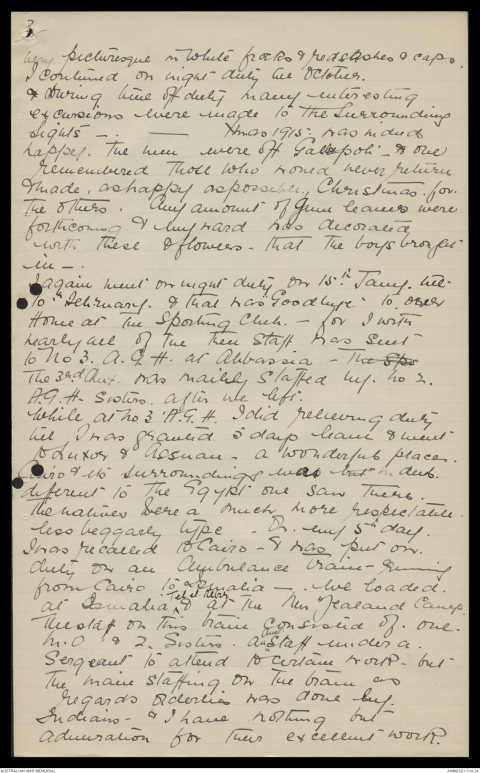
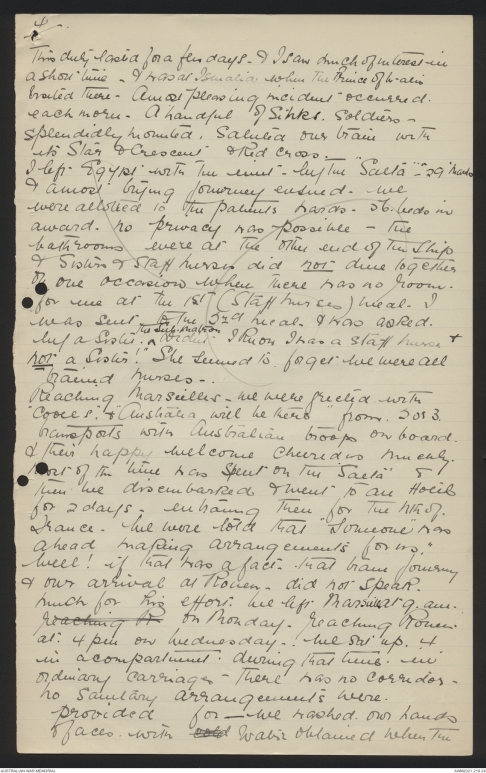
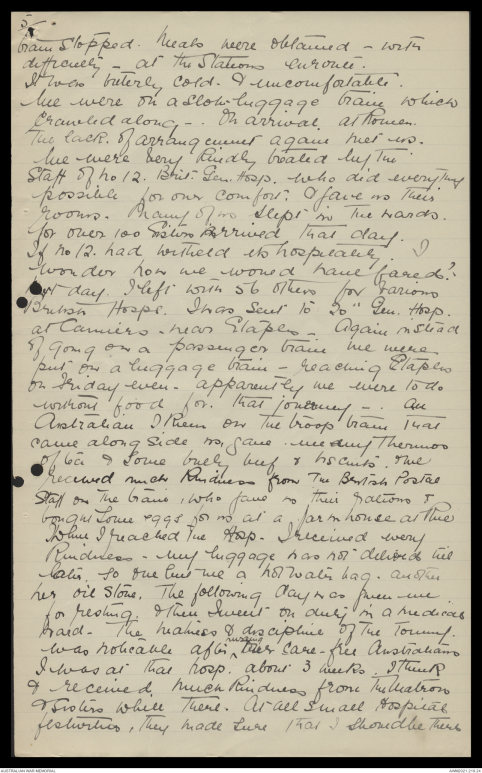
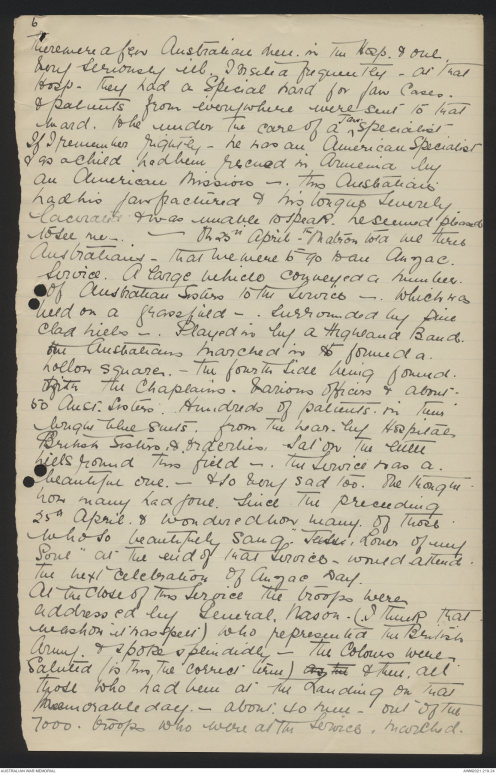
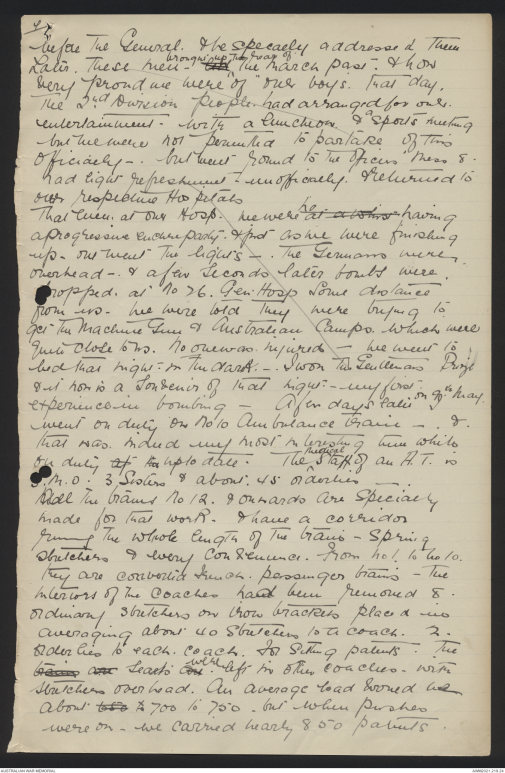
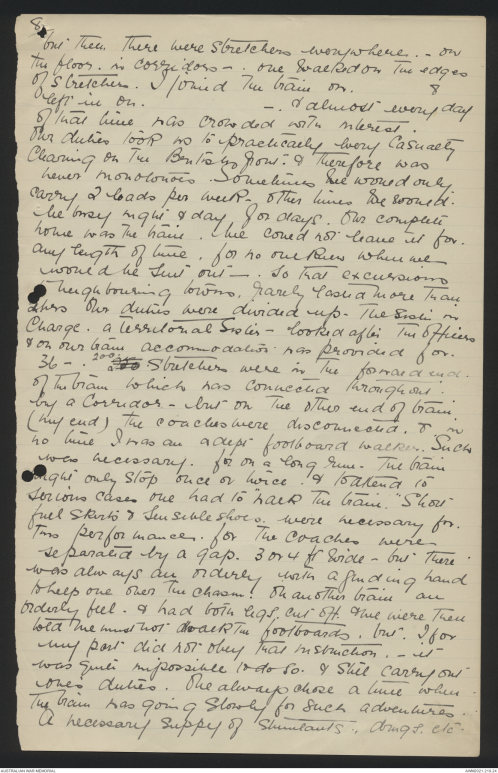
5/78
AWM 4 1
[*AWM 4 1*]
AUSTRALIAN ARCHIVES
ACCESS STATUS
OPEN.
SISTER E. G. DOBSON.
A.W.M.
LIBRARY
Classn No 373.2
[*964*]
France Sr E G Dobson [*80
66*]
C.C.S
Ambulance Train
To 20 Gen. Hosp. British
Cleanliness and discipline noticeable
after nursing care for Australian
British matron & officers very kind
and considerate to Australian Sisters
Special Jaw Ward.
in Ambulance Train - carried
850 patients during rushes.
Water scarce in trains- no way
of getting personal attire washed.
(3 baths in 3 months)
Winter 1916
To 12th Stat. Hosp, St Pol -
Infectious Ward - a good deal of
S & M each patient was moved to
a separate section of tents.
divided by much barbed wire
but as the same sister and
2 orderlies attended all the
patients - the barbed wire
was not of much use.
Very little linen - only an
occasional pair of pyjamas.
Acute dysentery nursed in Army
Blankets. Dip cases had to
[[?]]. Most had been innoculated
with antitetanus serum so could
not be given their full dose
of antitoxins. The injections
being spaced at ½ hourly
intervals Difficulty of
keeping serum warm and
sterilizing needles with
everything freezing, and a
shortage of coal, kerosene and
methy spirit. Splendid
orderlies - volunteers to R.A.M.C.
[[Opened?]] 12 months [[with?]] British and
left them with serious regret
as [[No?]] 1 A S H Rouen, Dec 1917 -
Cambrai stunt - had 14 amputation
[[arms?]] double, at one time in her
ward.
[*The Official War Historian of the Commonwealth
Government (Dr. C. E. W. Bean), after his study of the
collection of private war records preserved in the Australian
War Memorial Library, wrote : -
"The private diaries in this collection furnish some of its most
valuable historical records, but, like all private memoirs which were
not compiled with any historical purpose, they should not be
regarded as first-hand evidence except where it is certain that they
are so. The diarist is almost always sincere in his desire to record
accurately, but he is subject to no obligation or inducement to
indicate whether he is recording his own observations or incidents
told him by friends or heard at third or fourth hand at the mess-table.
Thus, in some of the diaries in this collection, scenes described with
vivid detail, and without any warning that they are told at second
or third hand, have been found to be completely inaccurate in
important details. A certain number also have been written up
or revised long after the events, though doubtless usually from notes
made at the time. In most cases the student must rely on his
experience and on internal evidence to guide him in judging what is
and what is not likely to be historically accurate".*]
France 80/66 ✓
War Service - 25th June 1915 to 25th June 1919. [*80/66*]
([[Leave?]] work)
Leaving Fremantle on June 25th - Deptt. M.T.S.A.63. "Karoola"
I proceeded to Egypt to join No 1. A.G.H.
We carried I think about 1400 troops, - nursing
deck sports - dances on the top deck & various
studies [f?] occupied our time till Aden was
reached. There were 45 members of the A.A.N.S. on
board - . There were a good many cases of
measles. & some meningitis -. So that those
who were well were fairly busy - I did about
15 nights "night duty" & as we got near the Equator
on to the Red Sea. - sleeping in the daytime
was almost an impossibility - It always
seemed that the piece of deck above my
head. was specially chosen. for a lecture or
physical drill etc. etc. - Still that was a very
little trouble
Reaching Aden, we found we found that the Turks.
were attacking near that town, & we stayed
in Aden. for 2 or 3 days. - we were told - "to
see how things were going"
The scene was wonderful - The [[?]] Sea -
the distant coast line yellow - & brown - &
ships from every where. Great cheers ^ arose when
along came the "Light Of Asia" - with Indian troops
[[a warship?]] transport carried Light Horsemen &
their horses. Here the heat was intense - &
of course - [we?] did not land - as the town was
considered unsafe. At last we started again
for. Suez. & ^ on reaching [[?]] Port Said "Good bye" to the "Karoola" &
the people on board who had indeed been.
kind to us - I feel that we had really
left Australia behind us there!
I was also assigned to The The 3rd troop train
& we reached. Cairo at night - & [No.1?]. A.G.H. at
Heliopolis about 10.30 pm. It had been a most
2
tiring day. our thick serge suits were not
comfortable wear for that climate!
A great trade was done. by the fruit sellers -
oranges, grapes, & melons were bought in
abundance. On arrival at the Hospital,
refreshment, bath & bed revived us - &
next morn. we reported for duty - & I
was put on night duty in the "Eye ward"
It was most unpleasant - as many were
infected eyes - Some were wounded -.
There were 73 beds in this ward. Dufs one
orderly on duty all night. A relieving orderly
after 4. a.m. & myself. I did 3 weeks duty
in that ward & was then sent to No 3.
Aux. Hosp. "The Sporting Club" - This was
then used as an Infections Hosp. & I
continued my night duty with some
Diptheria cases & later helped get the Hosp.
ready as No 3. Aux. This Hosp. when complete
contained over 2000 beds. & our first cases
were from the Lone Pine fighting. I think -
In one night over 700 cases were admitted - .
I will never forget the seemingly endless
line of men coming in - till every bed in
my section was full. The men were bathed
or sponged - dressings done - & by morning
our Hosp. was in full going order - .
This Hosp. was happily situated on the
grounds of the Heliopolis Sporting Club.
Avenues of gums, shrubs & flowering
trees made it a very pretty spot.
It was a happy Hosp. too & was almost
completely staffed by "Karoola" & "Landilla"
Sisters - Miss Conyers being the Matron.
& we were a happy contented family
We lived slept at 'the Palace" having our meals
at the Hosp - our servants were natives
3
very picturesque in white frocks & red sashes & caps
I continued on night duty till October.
& during time off duty many interesting
excursions were made to the surrounding
sights - . ----------- Xmas 1915 was indeed
happy. The men were off Gallipoli - & one
remembered those who would never return
& made as happy as possible, Christmas for
the others. Any amount of Gum leaves were
forthcoming & my ward was decorated
with these & flowers - that the boys brought
in - .
I again went on night duty on 15th Jany. till
10th February. & that was "Goodbye" to our
Home at the Sporting Club - for I with
nearly all of the then staff was sent
to No 3. A. G. H. at Abbassia - The spo
The 3rd Aux. was mainly staffed by No 2.
A.G.H. Sisters. after we left.
While at No. 3 A.G.H. I did relieving duty
till I was granted 5 days leave & went
to Luxor & Assuan - a wonderful place.
Cairo & its surroundings was but indeed
different to the Egypt one saw there.
The natives were a much more respectable
less beggarly type - On my 5th day.
I was recalled to Cairo & was put on
duty on an Ambulance Train - running
from Cairo to Ismalia - we loaded
at Ismalia ^ Tel-el-Kebr & at the New Zealand Camp.
The staff on this train consisted of one
M.O. & 2 sisters. All ^ Aust. staff under a
Sergeant to attend to certain work - but
the main staffing on the train as
regards orderlies was done by
Indians - & I have nothing but
admiration for their excellent work.
4
This duty lasted for a few days - & I saw much of interest in
a short time. I was at Ismalia when the Prince of Wales
visited there. A most pleasing incident occurred
each morn. A handful of Sihks Soldiers -
splendidly mounted. Saluted our train with
its Star & Crescent & Red Cross.
I left Egypt with the unit - by the "Salta" - 29 March
& a most trying journey ensued. We
were allotted to the patients wards. 56 beds in
a ward. No privacy was possible - the
bathrooms were at the other end of the Ship
& sisters & staff nurses did not dine together
on one occasion when there was no room.
for us at the 1st (Staff nurses) meal. I
was sent to the 3rd meal & was asked
by a Sister ^ the sub-matron [[?]] I know I was a staff nurse &
not a Sister! She seemed to forget we were all
trained nurses - .
Reaching Marseilles - we were greeted with
"Cooees" & "Australia will be there" from 2 or 3
transports with Australian troops on board
& their happy welcome cheered us muchly.
Most of the time was spent on the "Salta" &
then we disembarked & went to an Hotel
for 2 days - entraining then for the Nth of
France. We were told that "Someone was
ahead making arrangements for us."
Well! if that was a fact. that train journey
& our arrival at Rouen. did nor speak
much for his effort. We left Marseilles at 9 am.reaching R on Monday. Reaching Rouen
at 4 pm on Wednesday - . We sat up. [[?]]
in a compartment during that time in
ordinary carriages - There was no corridor -
no sanitary arrangements were
provided for – we washed our hands
& faces with cold water obtained when the
5
train stopped. Meals were obtained - with
difficulty – at the stations enroute.
It was bitterly cold. & uncomfortable.
We were on a slow luggage train which
crawled along - . On arrival, at Rouen.
The lack of arrangement again met us.
We were very kindly treated by the
Staff of No 12. Brit. Gen. Hosp. who did everything
possible for our comfort & gave us their
rooms. Many of us slept in the wards
for over 100 Sisters arrived that day.
If No 12. had witheld its hospitality. I
wonder how we would have fared?
Next day I left with 56 other for various
British Hosps. I was sent to 20th Gen. Hosp.
at Camiers - near Etaples - Again instead
of going on a passenger train we were
put on a luggage train - reaching Etaples
on Friday even. apparently we were to do
without food for that journey - . An
Australian I [[knew?]] on the troop train that
came along side us, gave us [[?]] thermos
of tea & some bully beef & biscuits. & we
received much kindness from The British Postal
Staff on the train, who gave us their rations &
bought some eggs for us at a farmhouse at [[Rues?]]
When I reached the Hosp. I received every
kindness - my luggage was not delivered till
later so one lent me a hot water bag. another
her oil stone. The following day was given me
for resting & then I went on duty in a medical
ward. The neatness & discipline of the Tommy
was noticable after ^ nursing the care-free Australians
I was at that hosp. about 3 weeks. I think
& received much kindness from the Matrons
& Sisters while there. At all small hospital
festivities, they made sure that I should be there
6
There were a few Australian men in the Hosp. & one
very seriously ill. I visited frequently - at that
Hosp. they had a Special ward for jaw cases.
& patients from everywhere were sent to that
ward. to be under the care of a ^ jaw specialist
If I remember rightly - he was an American Specialist
& as a child had been rescued in Armenia by
an American Mission - . The Australian
had his jaw fractured & his tongue severely
lacerated & was unable to speak. he seemed pleased
to see me. ------ On 25th April ^ the Matron told we three
Australians - that we were to go an Anzac
Service. A large vehicle conveyed a number
of Australian Sisters to the Service – which was
held on a grass field - surrounded by pine
clad hills - . Played in by a Highland Band.
the Australians marched in & formed a
hollow square. - The fourth side being formed
with the Chaplains. various officers & about
50 Aust. Sisters. Hundreds of patients in their
bright blue suits. from the near by Hospital
British Sisters & orderlies. Sat on the little
hills round this field - . The service was a
beautiful one - & so very sad too. We thought
how many had gone since the preceeding
25th April & wondered how many of those
who so beautifully sang "Jesus, Lover of my
Soul" at the end of that service - would attend
the next celebration of Anzac Day.
At the close of this service the troops were
addressed by General Nason (I think that
was how it was spelt) who represented the British
Army & spoke spendidly - The Colours were
Saluted (is this the correct term) as the & then all
those who had been at the landing on that
Memorable day – about 40 men - out of the
7000. troops who were at the service. marched.
7
before the General. & be specially addressed there
later. These men ^brought up the rear of the march past & how
very proud we were of "our boys" that day.
The 2nd Division people had arranged for our
entertainment with a luncheon & a sports meeting
but we were not permitted to partake of this
officially - but went round to the officers mess &
had light refreshment - unofficially. Returned to
our respective hospitals
That even. at our Hosp. we were at a whist having
a progressive euchre party & just as we were finishing
up out went the lights - . The Germans were
overhead - . & a few seconds later bombs were
dropped at No 26. Gen. Hosp Some distance
from us. We were told they were trying to
get the Machine Gun & Australian Camps which were
quite close to us. No one was injured - we went to
bed that night in the dark - I won the Gentlemans Prize
& it now is a souvenir of that night - my first
experience in bombing - A few days later ^ on 4th May I
went or duty on No 10 Ambulance Train - . & .
that was indeed my most interesting time while
on duty at the up to date. The ^Medical Staff of an A.T. is
S.M.O. 3 Sisters & about 45 orderlies --- .
All the trains No 12. & onwards are specially
made for that work. & have a corridor
running the whole length of the train - Spring
stretchers & every convenience. From no 1. to 10.
they are converted French passenger trains - The
interiors of the Coaches had been removed &
ordinary stretchers on iron brackets placed in
averaging about 40 stretchers to a coach. 2.
orderlies to each coach. For Sitting patients thetrains are seats are ^ were left in other coaches - with
stretchers overhead. An average load would be
About 650 to 700 to 750 but when pushes
were on - we carried nearly 850 patients.
8
but then there were stretchers everywhere. - on
the floor. in corridors - . one walked on the edges
of stretchers. I joined the train on. &
left in on. - . & almost every day
of that time was crowded with interest.
Our duties took us to practically every Casualty
Clearing on the British Front & therefore was
never monotonous. Sometimes we would only
carry 2 loads per week. Other times we would
be busy night & day for days. Our complete
home was the train. We could not leave it for
any length of time, for so one knew when we
would be sent out – . So that excursions
to neighbouring towns. Rarely lasted more than
2 hrs Our duties were divided up. The Sister in
Charge . a Territorial Sister - looked after the officers
& on our train accommodation was provided for
36 - . 200 250 stretchers were in the forward end
of the train which was connected throughout
by a corridor - but on the other end of train
(my end) the coaches were disconnected. & in
no time I was an adept footboard walker. Such
was necessary. for on a long run - The train
might only stop once or twice & to attend to
serious cases one had to "walk the train." Short
full skirts & Sensible shoes were necessary for
this performance. for the coaches were
separated by a gap. 3 or 4 ft wide- but there
was always an orderly with a guiding hand
to help one over the chasm. On another train an
orderly fell & had both legs cut off & we were then
told we must not [[walk?]] the footboards but I for
my part did not obey that instruction. - it
was quite impossible to do so. & still carry out
ones duties. One always chose a time when
the train has going slowly for such adventures.
A necessary supply of stimulants, drugs, etc.
 Sam scott
Sam scottThis transcription item is now locked to you for editing. To release the lock either Save your changes or Cancel.
This lock will be automatically released after 60 minutes of inactivity.